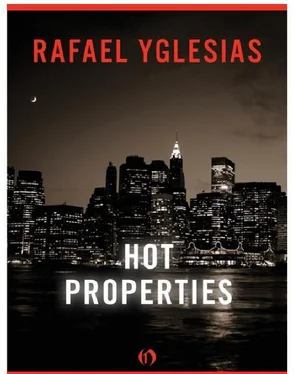“Uh. It doesn’t … well, Jimmy is—”
Tony laughed. “You don’t sound too sure.”
“Yeah, well, I don’t think that’s important. Jimmy’s a producer. He wants the project to work. He wants a go. He doesn’t care who he steps on in the process.”
“Yeah, but …” Tony sighed. “Look, I don’t want to work in a situation where one of my bosses—”
“We’re not your bosses, Tony. We’re your partners.”
“Bill, my mommy taught me that when somebody can hire and fire, that makes him a boss.”
“How is your mom? Do you think there’s a part for her in this?”
“You mean if Meryl doesn’t accept?”
Garth really laughed at that one. His first relaxed, genuine laugh. “I was just thinking it would be great if we could fit her into a great cameo.”
“Maybe. It’s an idea.”
“Will you help me out, Tony? There’s nobody else who can pull this off for me. I’d love to fly you out, talk some, and maybe you can stay at my house in Malibu. Do the rewrites there. We can talk out the pages each night. I’ve already discussed this with Gloria — I’m sure International will renegotiate your contract to give you some more money. What do you say?”
Tony smiled. He could feel the oppressive madness of the last nine months lifting. At last, someone had admitted to being wrong, that he did have talent, that he did know what made a good story and what didn’t. “Let me think about it, okay?”
“Sure, sure. I really hope you do it. This movie can really work. For both of us, it can be a breakout project.”
Gloria Fowler called minutes later. Tony’s relief had become exhilaration. “I can’t get over it, Gloria. He’s practically begging me.”
“I know,” she purred. “It’s wonderful. So you’re going to do it.”
“I’d love to tell him to go fuck himself. He put me through hell. My confidence has been shot for almost a year!”
“Well, that shouldn’t have happened. I wish you had called me. Writers have trouble on movie projects all the time — they’re fired, they have to rewrite. It’s nothing to beat yourself up over.”
“I know. I was a fool. But this is a great payback. Garth on the phone asking me to stay at his house! Incredible!”
“I think you should say yes. He’ll be a pussycat about this rewrite. He wants to do this picture desperately. He’s got nothing on the boards, everything else has collapsed, and you know he hasn’t been up there on the big screen in three years. They could be shooting this in the late fall.”
“All right. Fuck it. I’ll say yes — I mean to the deal. About staying in his house in Malibu, I don’t know.”
“Garth’s serious about that.”
“Really?”
“Really — and frankly, it’s a good career move.”
Gloria asked about his play. He had told her, when he declined to do the first-draft rewrite, that he would be busy on a play for a while, and though she hadn’t sounded enthusiastic then, she now seemed genuinely interested in his progress. Finally she asked an odd question:
“How are your folks?”
“I guess they’re okay. I spoke to Mom last week — she was her usual self. Complaining about her scripts.”
“And your father?” Gloria said, her tone strangely loaded with significance.
He hesitated for a moment, wondering if he should admit the truth, but caution didn’t suit his temperament. “I almost never talk to my father. I see him maybe twice a year when he comes through New York.”
“Oh …” Gloria said in a voice that suggested this was surprising. “I heard he was in town last week.”
“Really? Well, he didn’t call. But the coolness between us is because of me. I … you know, he wasn’t very good to my mother and I think he senses my disapproval of him.”
“Oh. I see.”
Tony laughed. “Gloria, you sound absolutely crushed.”
“I’m sorry, I got a little distracted by something on my desk … uh, but you don’t hate each other?”
“Hate? No, no. I don’t like to see him — I think he would love to change that.”
“Ah,” she said, sounding quite relieved. “Well. I’d better get back to Garth — he’s quite hot about closing this. Speak to you soon.”
Tony wondered about her interest in his family relations, but not for long. The sheer joy of replaying his conversation with Garth had transported him. He called Betty to chortle over it, spoke to several theater friends, mentioning it casually, saying it was another example of the movie business’s foolishness and that he would play along just for fun. But the dark truth was not hidden from him: he knew, no matter how embarrassing it might be to admit, that this single flattering phone call from a vain actor was enough to restore his self-portrait and repair ail the chips, tears, and fading of the last year.
David nodded at Rounder’s secretary as she said, “Go on in,” and opened the closed door to the office. Chico, Harpo, and Rounder paused in mid-sentence. They looked concentrated, their eyes blankly taking him in. “Close the door,” Chico said, unnecessarily, for David was already doing so. “Is your passport in order?” Chico asked like a border guard in a thriller.
David smiled. “Yes. The cover’s so bad we’re fleeing the country?”
Harpo laughed, but Chico and Rounder had no humor in them today. Rounder looked pale and tired. He had been on a seemingly endless tour of events with Mrs. Thorn, from Washington dinners to visits to far-flung bureaus, supposedly to boost morale. Chico had been left to run the magazine, deserted, so that he had to do a good job of it. Indeed, the commonly held theory within Newstime was that Mrs. Thorn, in her mind, had already fired Rounder and elevated Chico to Groucho. Naturally this muddy earth upon which both men stood made them irritable and insecure, Chico’s feet sticking unpleasantly as he tried to move to higher ground, Rounder nervously unsure as to whether the glop beneath him would harden or suck him under to drown.
“No bullshit,” Chico said. “Is your passport in order?”
“Yes, sir,” David said. “I’m compulsive about those things. Haven’t been anywhere in five years but I renew my pass—”
“Good,” Chico cut him off. “You may have to fly to Brazil tomorrow.”
“Really?” David consciously showed no excitement. It had become automatic not to respond with the predictable gee-whiz that was typical of young staffers. Although it seemed silly, he believed a substantial portion of his success was due to surface behavior of this sort. He sat down and looked interested — in a mild way.
“We may have our hands on a big story—” Rounder began.
“Exclusively. We have to keep this totally buttoned up,” Chico interrupted, though he spoke not as if he had talked over his boss, but rather as if no one had been talking. David noticed Rounder bow his head and lower his eyes when it happened, like a farmer patiently suffering the stubbornness of an animal he needed to reap a harvest, but wished he could instead slaughter for food. “So no gossiping, no sign that you might have to go somewhere. If you leave, we’ll simply tell people you’re out sick.”
“Okay. This sounds exciting,” David remarked. “What’s up?”
“We may have found Josef Mengele’s chief assistant— Hans Gott. He’s—” Rounder began.
“—willing to give us an exclusive interview!” Chico finished. “He was Mengele’s right-hand man. Stood there with a clipboard charting the experiments. Apparently he escaped with Mengele. He may have the whole inside story from gas chambers to drowning. Here are the files on Gott.” Chico handed David a folder. “You’re our choice to do the interview.”
Читать дальше












